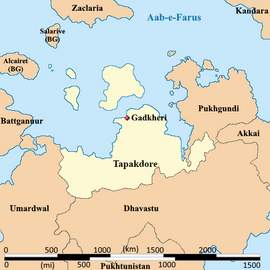Tapakdore
This article is a work-in-progress because it is incomplete and pending further input from an author. Note: The contents of this article are not considered canonical and may be inaccurate. Please comment on this article's talk page to share your input, comments and questions. |
Queendom of Tapakdore | |
|---|---|
|
Flag | |
 Location of Tapakdore | |
| Largest largest city | Bambarapola |
| Official languages | Sinhala, Burgoignesc |
| Ethnic groups | Primarily Sinhalese |
| Religion | Primarily Buddhism |
| Demonym(s) | Tapakdi |
| Government | Monarchy |
| Establishment | |
• Independence | 1811 |
| Area | |
• Total | [convert: invalid number] |
| Population | |
• 2028 estimate | tbd |
• Density | [convert: invalid number] |
| GDP (nominal) | estimate |
• Total | tbd |
• Per capita | tbd |
| Currency | Common Middle Sea Florin (CMS ƒ) |
| Driving side | right side |
Tapakdore, officially the Queendom of Tapakdore is a developing nation in the Audonian region of Daria. It is bound by Pukhgundi in the north, Dhavastu in the south, and a small stretch of the southern coast of the Sea of Saksona. Its capital and only coastal region is becoming more heavily urbanized with its interior remaining largely rural.
Tapakdore has an absolute monarchy who fills the role of both legislature and executive, and a supreme court, which has been criticized for being a puppet of the monarch.
It is a member of the League of Nations, the International Red Cross and Red Crescent Movement, and many other international organizations.
It is in the process of transiting to a market economy from a command economy under the watchful eye of Burgundie, and the Middle Seas Region, it does not have a large export economy yet, but exploration companies from Burgundie have found evidence of deposits of rare earth metals that will be mined in the near future. There is a small fishing, ship breaking, and recycling economy that Burgundie is also investing in to expand and connect tot he global trade network.
Many scholars have criticized its economic governance and politics, arguing that it is merely a client of the Burgoignesc thalattocracy's economic and cultural might.
The people of Tapakdore are predominantly culturally Sinhalese, speak Sinhala, and most practice Buddhism.